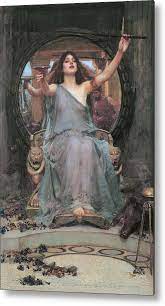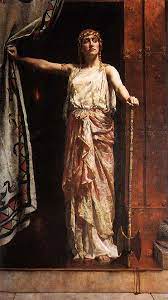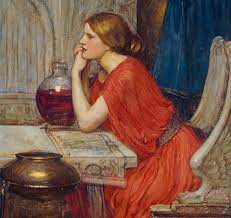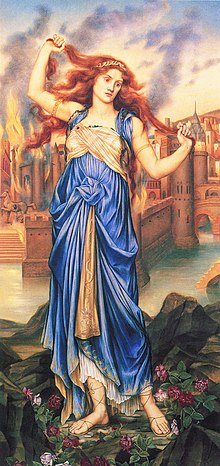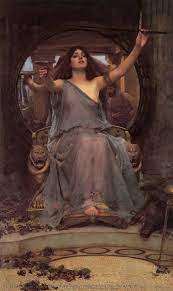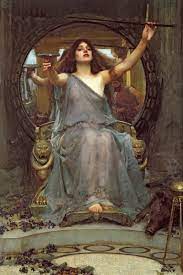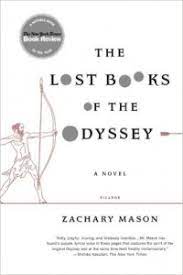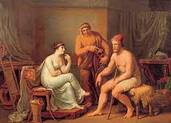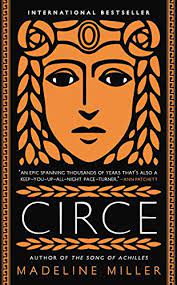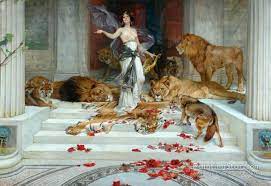|
Cassandra: Cassandra character analysis
Cassandra
|
Written by Christa Wolf, an East German author raised in a communist society, Cassandra is a modern retelling of the Trojan war from Cassandra’s point of view. This novel takes the reader on a journey through Cassandra's mind and her prophecies.
Cursed by Apollo, Cassandra is fated to know the future but never to be believed by her peers. She is full of self-doubt and feelings of unwantedness from her friends and family. I think this is evident in multiple quotes from Cassandra. One quote that stuck out to me states, “There is something of everyone in me, so I have belonged completely to no one, and I have even understood their hatred for me”(Cassandra, 4). This quote really lets the reader understand her feelings about her prophecies and how they make her perceive herself. Another quote to the point of her self-doubt says, “Where did I get the right to make such pronouncements”(Cassandra, 7). I think her relationship with Myrine does anything but help these feelings as well. In the beginning of the book, Myrine and Cassandra are discussing Cassandra’s “beliefs”. Myrine continuously questions and discredits Cassandra’s prophecies, although she thinks they are just Cassandra’s ill-advised opinions, with an aggressive undertone to her words. The contempt in the relationship is not one-sided though. Cassandra does not like Myrine either going as far as to say she will rejoice when Myrine’s death comes (Cassandra, 7). This tumultuous relationship degrades Cassandra’s self-confidence and reiterates her doubt in herself. Additionally, another trait I found in Cassandra was her spiteful nature. She states early on, thinking about Myrine, “... her fear of being touched, which I never infringed until the moment I was allowed to wind her blond mane around my hand and so found out how very much I had felt like doing that for so long”(Cassandra, 7). This, to me, shows the audience her potential to be cruel and unrelenting. How she is not just self-doubting at times but also full of rage and malice with her actions. Wolf, Christa. Cassandra. Edizioni e/o, 2011. |
|
House Of Names: "Like mother, like daughter". Clytemnestra and Electra
Electra
|
House Of Names, by Colm Toíbín, is a modern novel retelling the story of the royal family of Mycenae. One important character, Electra, daughter of Agamemnon and Clytemnestra, is a storyteller of this tragedy. She is a force to be reckoned with in this retelling from a new point of view. She seems to be, unknowingly, a mirror image of her mother Clytemnestra. They are both bitter, manipulative, smart, and vindictive. Throughout the story, Electra plots her way to the throne manipulating and using her brother Orestes to do her dirty work of murdering their mother. Her mother has the same thirst for power, precisely where Electra gained this quality, with no limits to her vengeful actions. Clytemnestra states once, “Murder makes us ravenous, fills the soul with satisfaction that is fierce and then luscious enough to create a taste for further satisfaction”(Toíbín, Colm. House Of Names). This shows her true intentions and vengeful nature. Electra shares these qualities shown in her actions of manipulating her brother into murdering their mother for her power. Clytemnestra also states, “I have been acquainted with the smell of death. The sickly, sugary smell that wafted in the wind towards the rooms in this palace. It is easy now for me to feel peaceful and content”(Toíbín, Colm. House Of Names). Their bloodlust and selfishness is shown time and time again through their actions toward family. Clytemnestra murdered Agamemnon for his power, banished Orestes to keep him away from his rightful throne, and kept Electra from getting married to keep her away from her own power. Similarly, Electra plays the loyal daughter to Clytemnestra for virtually her whole life while quietly brewing in her own rage and distrust and ultimately committing the same act that made her hate her mother in the first place. Their relationship is strained and faked for the most part because of their ulterior motives. As another writer asserts, “paranoia abounds within every relationship (“a performance that started with smiles and ended with shrieks,” as Electra puts it)”(“House Of Names” Kirkus Reviews).
“House of Names Quotes by Colm Tóibín.” Goodreads, Goodreads, https://www.goodreads.com/work/quotes/49581453-house-of-names. Tóibín, Colm. “House of Names.” Kirkus Reviews, Scribner, 9 May 2017, https://www.kirkusreviews.com/book-reviews/colm-toibin/house-of-names/. Tóibín, Colm. House of Names. Penguin Books, 2018. |
|
The Lost Books Of The Odyssey: Themes of Ignorance and death
Odysseus and Penelope
|
The Lost Books Of The Odyssey, as described by Goodreads is, “Zachary Mason’s brilliant and beguiling debut novel, The Lost Books of the Odyssey, reimagines Homer’s classic story of the hero Odysseus and his long journey home after the fall of Troy”(The Lost Books of the Odyssey by Zachary Mason.” Goodreads). Odysseus in Mason’s version seems to be more relatable compared to Homer’s extravagant hero, being true to himself and lacking the qualities that all tragic heroes seem to have of thinking they are flawless and infallible.
One theme that seems to be common among many, if not all ancient tragedies, is the notion that humankind is ignorant, selfish, and doomed to repeat the past. A quote from Mason’s novel that supports this states, “It seemed odd no one had thought of it before but in general there is no accounting for the bovine stupidity of mankind”(The Lost Books of the Odyssey Quotes by Zachary Mason.” Goodreads). And an additional quote asserting, “A long time from now someone unknown to me will stand on the white plain where I now stand. He will speak a different language and the mountains in the distance may have been ground down but there are certain constants that will reliably inform his life -- kings like great trees whose roots are watered in ignorance, men who come to war reluctantly only to discover they have the souls of jackals, and fortresses like mountains, as immovable and inevitable”(The Lost Books of the Odyssey Quotes by Zachary Mason.” Goodreads). Both of these quotes demonstrate mankinds blindness and disregard for past flaws. That humans are the depiction of stupidity and selfishness because they refuse to or are incapable of retrospection. Another theme that can safely be said is common in all tragic myths is death. Death being a crossing over from the land of the living to the land of the dead and how the dead no longer recognizes, or care to recognize, the living. They have no reason to anymore. Also, that death is inevitable and cannot be stopped so the living should make everything count on their one way trip to the underworld. “The Lost Books of the Odyssey by Zachary Mason.” Goodreads, Goodreads, 1 Mar. 2008, https://www.goodreads.com/book/show/2199365.The_Lost_Books_of_the_Odyssey. “The Lost Books of the Odyssey Quotes by Zachary Mason.” Goodreads, Goodreads, https://www.goodreads.com/work/quotes/2205119-the-lost-books-of-the-odyssey. Mason, Zachary. The Lost Books of the Odyssey. Vintage, 2011. |
|
Circe: Circe character analysis
Circe
|
Written by Madeline Miller, Circe is a love letter to following your true purpose and desires. In her story, Miller gives the otherwise minor character, a feminist twist with a bone to pick with the gods. Circe is a witch who lives on the island of Aiaia and has the ability to turn humans into animals. Being part wolf herself, she has an enigmatic and wild side to her that cannot be tamed. An event that gives away her true colors of divine vengeance and feminst beliefs is how she enacts retribution. While on her island of Aeaea, she is raped by human men who view her as weak and naive due to her lack of a man by her side, because men will respect another man whom they've never met but not the woman standing directly in front of them. After being brutally attacked she turns the men into the pigs she believes they are, to later be slaughtered and eaten. Like she can see into their souls and read their true nature, she turns anyone who is rotten at their core into their accurate outward animal representation. A quote that I think delineates her bitter awakening says, “When that first crew had come, I had been a desperate thing, ready to fawn on anyone who smiled at me. Now I was a fell witch, proving my power sty after sty”(Susan September, THE ROAD TAKEN TO). Some may see her actions as plain “anti-man”, but she only turns vile people into their true nature, who are coincidentally mostly men. Another quote that sticks out, illustrating her newfound strength and resilience after her attack reads, “it is a common saying that women are delicate creatures, flowers, eggs, anything that may be crushed in a moment's carelessness. If I had ever believed it, I no longer did”(“Circe Quotes by Madeline Miller.” Goodreads). I found this one very powerful showing her fortitude in such an ungodly situation.
One important relationship she has in her story is with Hermes, the messenger of the gods. Their “romantic” relationship is nothing that would be considered wholesome because they use each other for their own personal advantages. Hermes uses Circe as a play thing to entertain himself by misleading or withholding information, while Circe uses hermes as a way to further her magical skills and gather information from. Their relationship takes a turn however when Hermes makes a flippant joke about the nymphs on Circe's island. He states in many more disgusting words, that the nymphs are there for physical pleasure, nothing more, and should be taken advantage of if they refuse their ‘true purpose’. Circe, being a victim of what Hermes implies, is filled with rightful rage and tells him she no longer has any use for him or the gods in general. All the gods view humans as ignorant objects to play with. Circe states, regarding the gods and their attitudes toward humanity, “I thought once that gods are the opposite of death, but I see now they are more dead than anything, for they are unchanging, and can hold nothing in their hands”(“Circe Quotes by Madeline Miller.” Goodreads). They are incapable of empathy or any other human emotion worth having to be revered as worship-worthy. They are the most vile creatures of all with their blatant disregard for life itself and that is why she chooses to be human at the end of the novel. She cannot stand the thought of living until the end of time like the gods and must distance herself before it is too late and before she would ever, over time (which I dont think would happen because of her aforementioned strength), become just like them. 17, Susan September, et al. “18 Hauntingly Beautiful Quotes from ‘Circe’ by Madeline Miller.” THE ROAD TAKEN TO, 25 Sept. 2021, https://theroadtakento.com/reflections-circe-by-madeline-miller/. “Circe Quotes by Madeline Miller.” Goodreads, Goodreads, https://www.goodreads.com/work/quotes/53043399-circe. Miller, Madeline. Circe a Novel. Back Bay Books, 2020. |
|
The Penelopiad: Penelope character analysis
Penelope and Odysseus
|
The Penelopiad, written by the extremely accomplished Margaret Atwood, is an ancient Greek myth set in modern times. Told from the underworld after Penelope’s death, the audience reminisces with the main character of her unclaimed wrongdoings. She proves to be quite the unreliable narrator as her ego and ill perceived innocence of her maids' treacherous work conditions and untimely deaths are swept under the rug and made much less important than they truly are. Penelope asks her maids to spy on the suitors living with them. They obey her wishes and are subsequently raped or mistreated because of Penelope’s request. When they come back to haunt her after their deaths by hanging, she wonders why they will not leave her alone, or why they chase Odysseus away from her. Comparing her to Madeline Millers character Circe, she is the exact oppositie when it comes to womens rights and acts of sexual violence committed towrads women. Circe seems to be a feminist goddess rightfully hellbent on avenging sexual violence. Penelope, however, is far from sharing Circe’s views of justice or vengeance. Penelope says that several of her maids were “unfortunatley raped” and that it was only a problem because their master did not give the suitors permissiohn to rape them. Heaven forbid it be a heinous crime because they were nonconsenting victims of sexual violence.
Along with being egotistical and seemingly against basic human rights, she is also narcistitic and power hungry, shown during her life and after her death. One quote that stands out and attests to her narcissism and greed for control reads, “Which of us can resist the temptation of being thought indispensable?”(“The Penelopiad Quotes by Margaret Atwood.” Goodreads). Another one that goes beyond standing out and that really bothers me and affirms her feminsit values (or lack thereof) goes, “I am tempted to think that to be despised by her sex is a very great compliment to a woman”(“The Penelopiad Quotes by Margaret Atwood.” Goodreads). This one shows her only loyalty or concern in the world is herself. Instead of standing up for women like her maids, she uses them as collateral to get what she wants, not sparing a second thought to the consequences of her actions and only looking forward to her personal reward. One blogger writes of Penelope, “Penelope’s main source of tension is with another woman – even in death, she is bitterly jealous…”(Girl with her Head in a Book). Maybe her jealousy is what makes her greedy, narcissistic, and, so accurately put, ‘bitter’. Atwood, Margaret. The Penelopiad. Alberta Theatre Projects, 2010. Girl with her Head in a Book. “Review: The Penelopiad, Margaret Atwood.” Girl with Her Head in a Book, 6 Mar. 2017, https://girlwithherheadinabook.co.uk/2017/01/review-the-penelopiad-margaret-atwood.html. “The Penelopiad Quotes by Margaret Atwood.” Goodreads, Goodreads, https://www.goodreads.com/work/quotes/3016476-the-penelopiad. |
